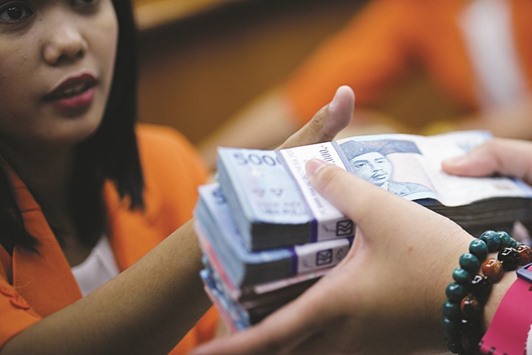Indonesia has chosen a good time to tap the global Islamic bond market as it attracts record inflows with developing Asia’s best-performing currency and local sovereign debt.
The government plans to offer Shariah-compliant notes in March, Scenaider Siahaan, director at the Finance Ministry’s budget financing and risk management office, said by text message yesterday. Aberdeen Islamic Asset Management Sdn forecasts an auction yield of 4.5% to 4.8% for 10-year securities, while Maybank Investment Bank Bhd sees around 4.65% to 4.75%. The nation’s 10-year 4.325% dollar sukuk sold in May 2015 yielded 4.71% yesterday.
The rupiah is the top-returning emerging-market currency in the past six months and Indonesian sovereign bonds are the best in Asia as President Joko Widodo cuts red tape and opens up more industries to foreign involvement. Fourth-quarter economic growth beat analysts’ expectations and overseas investors have pumped almost $5bn into the country’s local-currency sovereign debt since Sept. 30. “Growth is good and Indonesia is, among emerging-market credits, especially in the investment-grade space, one of the strongest,” said Sergey Dergachev, a senior money manager who helps oversee about $13bn of assets at Union Investment Privatfonds GmbH in Frankfurt. “I do like Indonesia fundamentally and would definitely take a look at a sukuk paper,” he said, adding he was targeting a yield of 5.15% to 5.2%.
Investors in the rupiah have reaped a total return of 7.4% over six months through Monday, the most among emerging markets. Indonesia’s local-currency sovereign bonds have rallied 8.3% over the same period, according to Bloomberg indexes. Foreign investment in the notes peaked at an unprecedented 590tn rupiah ($44bn) last week, more than 39% of the total outstanding debt.
Indonesia will sell as much as $2bn of Islamic notes, people familiar with the matter said January 27. The government has mandated five lenders including Citigroup Inc and Deutsche Bank AG for the sale, they said.
Indonesia’s 10-year global sukuk may beat that of crude exporter Malaysia this year if the oil price keeps weakening, said Hasif Murad, an investment manager at Aberdeen Islamic in Kuala Lumpur. This could be further reaffirmed if President Widodo manages to push through key reforms and speed up infrastructure development, he said.
Widodo is planning to boost spending on roads, ports and power plants this year, as well as grant a tax amnesty in an attempt to get individuals and companies to repatriate funds. Restrictions were relaxed on foreign investment in toll roads, logistics and cinemas last week and the president said the nation can’t afford not to join the Trans-Pacific Partnership free trade agreement.

A customer hands over bundles of Indonesian 50,000 rupiah notes to a customer at a currency exchange office in Jakarta. The rupiah is the top-returning emerging-market currency in the past six months.
